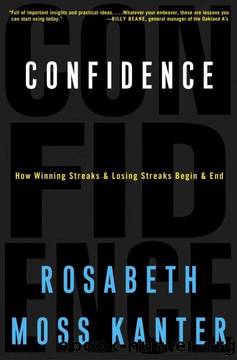Confidence: How Winning and Losing Streaks Begin and End by Rosabeth Moss Kanter

Author:Rosabeth Moss Kanter [Kanter, Rosabeth Moss]
Language: eng
Format: epub
Tags: Applied Psychology, Business, Economics, Non-Fiction, Personal Growth, Personal Success, Psychology, Self-Esteem, Self-Help
ISBN: 1400052904
Google: 4CXEy6H1deMC
Amazon: B000FC27RC
Publisher: Crown
Published: 2004-09-06T23:00:00+00:00
HOW LEADERS TEACH
It is a long distance and a big leap of imagination from global giant Gillette to a small inner-city elementary school in a poor neighborhood in the American South. But Marty Pettigrew, the principal of Peabody Elementary School in Memphis, Tennessee, tackled the task of restoring the first cornerstone of confidence with the same energetic leadership shown by international business executive Jim Kilts. I was struck by the similarities in actions and style. Both men established widespread dialogue, relied on objective data and performance metrics, and taught people to use feedback to guide improvements. By surfacing problems and discussing them openly, they encouraged teamwork and development of innovative solutions.
Pettigrew got started as quickly as Kilts. He was described by teachers and parents in terms that could have applied to Kilts. They said Pettigrew was “very direct.” He “lets you know what he needs.” “He wants your input.” “He is sure of himself and his expectations.” Even his words reminded me of Kilts’s messages. Pettigrew told a teacher unnerved by rapid changes, “If you think this has been fast, I haven’t begun yet.” He informed a parent who had asked about his emphasis on data and frequent measurement that “it’s not about the numbers, it’s about the consistency.”
Unlike Gillette, of course, report cards and testing are part of the requirements of a school, especially important under American state and federal legislation trying to make K-12 schools more accountable for children’s achievement. But that didn’t mean the people working in the Peabody school automatically embraced accountability. Pettigrew had taken on a rundown school with many of the characteristics of a losing streak.
Pettigrew was appointed in December, just before the holidays. Although the school year was more than half over, nearly 50 percent of the teachers had not yet undergone the regular staff evaluations that the Memphis City School board required. Peabody had also ducked accountability because test scores and dropout rates were improved by the addition of an optional magnet program in international studies, which attracted good students from other parts of the city, thus hiding the fact that the school was failing the generally poor neighborhood kids.
Pettigrew walked into a school with dingy brown walls and rundown attitudes. The walls were papered with posters explaining the school’s discipline guidelines and students’ discipline options. But, in reality, discipline standards were inconsistent. This was an organization in which no one seemed to take responsibility for the overall performance of the school, or even for achieving educational results themselves. There was no shared structure to the school week, nor was time set aside for planning. Everyone was on his or her own. Teachers had not been required to submit lesson plans, and they often reorganized their own class schedules when they felt like it, without concern for any impact on others. Monthly faculty meetings had been merely rote recitals of routine logistics. Teachers had rarely visited the former principal’s office during the day; anyway, she had been seen as uncommunicative and as someone who played favorites.
Download
This site does not store any files on its server. We only index and link to content provided by other sites. Please contact the content providers to delete copyright contents if any and email us, we'll remove relevant links or contents immediately.
| Ethics | Etiquette |
| Fashion & Image | Health & Stress |
| Motivation & Self-Improvement | Work Life Balance |
| Workplace Culture |
Tools of Titans by Timothy Ferriss(6947)
Change Your Questions, Change Your Life by Marilee Adams(6641)
Deep Work by Cal Newport(5465)
Man-made Catastrophes and Risk Information Concealment by Dmitry Chernov & Didier Sornette(4736)
Big Magic: Creative Living Beyond Fear by Elizabeth Gilbert(4723)
The Slight Edge by Jeff Olson(4722)
Digital Minimalism by Cal Newport;(4542)
The Motivation Myth by Jeff Haden(4527)
Stone's Rules by Roger Stone(4415)
Ego Is the Enemy by Ryan Holiday(3991)
The Laws of Human Nature by Robert Greene(3946)
Tuesdays with Morrie by Mitch Albom(3832)
Rising Strong by Brene Brown(3781)
Eat That Frog! by Brian Tracy(3514)
Skin in the Game by Nassim Nicholas Taleb(3460)
The Money Culture by Michael Lewis(3284)
Skin in the Game: Hidden Asymmetries in Daily Life by Nassim Nicholas Taleb(3264)
Believe It to Achieve It by Brian Tracy & Christina Stein(3206)
Bullshit Jobs by David Graeber(3180)
